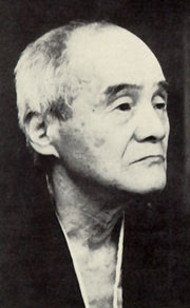Tanabe Hajime
| Hajime Tanabe | |
|---|---|
 |
|
| Born | 3 February 1889 Tokyo, Japan |
| Died | 29 April 1962 (aged 73) Kita-Karuizawa, Japan |
| Notable work | Philosophy as Metanoetics |
| Era | 20th-century philosophy |
| Region | Eastern and Western Philosophy |
| School | Ontology Existentialism |
|
Main interests
|
Philosophy of religion, Ontology, Philosophy of science, Philosophy of mathematics, Ethics, Metaphysics |
Hajime Tanabe (田辺 元 Tanabe Hajime?, February 3, 1885 – April 29, 1962) was a Japanese philosopher of the Kyoto School. In 1947 he became a member of the Japan Academy, in 1950 he received the Order of Cultural Merit, and in 1957 an honorary doctorate from University of Freiburg.
He was born in Tokyo. His father was the school principal of Kaisei Academy. He enrolled in the university of Tokyo first as a natural sciences student, then moved to literature and philosophy. After graduation, he worked in Tohoku University as lecturer.
Tanabe was a founding member of what has become known in the West as the Kyoto School, which also includes the notable philosophers Kitaro Nishida and Keiji Nishitani. While the latter philosophers have received recognition in western philosophy, Tanabe's writing has received less notice. All the philosophers of this school received opprobrium for their perceived active role in the Japanese empire's nationalistic regime. However, their participation in resistance to the political environment has been documented widely by James Heisig. Tanabe has come under more scrutiny and opprobrium for his political activities, though scholarship provides some mitigation of the harsher picture of Tanabe as an ardent fascist in the mold of his one-time teacher, Martin Heidegger.
Tanabe was born in a household devoted to education. His father was principal at the Kaisei high school. Tanabe's father was also a scholar of Confucius, whose teachings may have influenced Tanabe's philosophical and religious thought. Tanabe also taught English at Kaisei after graduating from the University of Tokyo.
After graduating from university, Kitaro Nishida invited Tanabe to teach at Kyoto Imperial University (now Kyoto University). After Nishida's retirement from teaching, Tanabe succeeded him. Though they began as friends, and shared several philosophical concepts such as Absolute Nothingness, Tanabe became increasingly critical of Nishida's philosophy. Many of Tanabe's writings after Nishida left the university obliquely attacked the latter's philosophy.
...
Wikipedia
